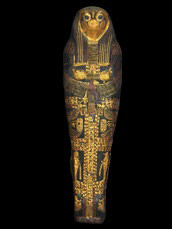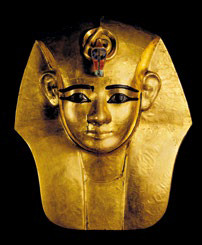Ramsès et l'or des pharaons
The exhibition
First deposited as a precaution in the tomb of his father Sety I and then in that of Queen Inhapy, before being secretly moved around the tenth century B.C., along with thirty-five other royal sarcophagi, to a hiding place on the Theban Mountain at Deir el-Bahari, the mummy of Ramses was found by chance in 1881. Restored and honored as a head of state in 1976 in Paris, the precious remains are no longer on the trip. La Villette has to make do with the cedar wood coffin that housed it, a reuse that probably dates back to Ramses I, grandfather of the deceased. The surface, once gilded and encrusted with stones, has been scraped away, leaving only the eyes, outlined in black, and various inscriptions authenticating his name and recalling the chance of his peregrinations. His glorious capital of Pi-Ramses, located on an eastern arm of the Nile delta, close to the Hittite armies based in Syria, has also disappeared, having been abandoned after its silting up.
Extract from the article by Emmanuel Daydé published in the N°106 of the magazine Art Absolument. Publication date: May 17, 2023.
Extract from the article by Emmanuel Daydé published in the N°106 of the magazine Art Absolument. Publication date: May 17, 2023.
When
07/04/2023 - 06/09/2023

